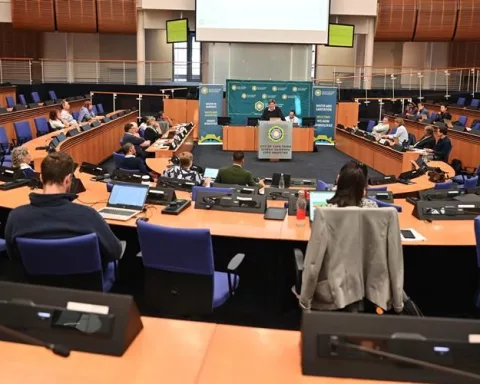Cape Town is leading Africa’s green economy movement and attracting sustainable investments by prioritizing resilience in response to the threat of climate change and employing effective Public-Private Partnerships (PPPs). The city’s commitment to sustainability extends across various sectors, opening up substantial financial possibilities and sparking an influx of green investments. Cape Town’s success is characterized by its steadfast devotion to sustainability, which imbues every aspect of the city’s operations, from urban planning to waste disposal. The city is emerging as a global standard for eco-friendly cities, actively contributing to a more sustainable future for all.
Cape Town: Leading Africa’s Green Economy Movement and Attracting Sustainable Investments
Cape Town is prioritizing resilience in response to the threat of climate change, solidifying its status as Africa’s leading center for the green economy. One of the crucial catalysts for Cape Town’s success is its effective employment of Public-Private Partnerships (PPPs). These resources equip eco-friendly businesses and potential investors with the necessary tools for informed decision-making. Cape Town’s green strategies extend across various sectors, opening up substantial financial possibilities and sparking an influx of green investments.
Facing Climate Realities: A Turning Point for Cape Town
In light of recent climate calamities, from devastating floods to unprecedented heatwaves, cities worldwide are reaching a critical juncture, and Cape Town is no different. The pressing need for climate action is prompting Cape Town to reassess its approach to promote commerce and investment, leading the city to prioritize resilience in response to the impending threat of climate change.
Cape Town’s commitment to sustainable principles is deep-rooted and steadfast. The city has emerged as a robust advocate for the environment, solidifying its status as Africa’s leading center for the green economy. This commitment to resilience, combined with an expansive landscape rife with opportunities for green investments, cements Cape Town’s position as a global hub for eco-conscious businesses.
Addressing climate change requires more than merely strengthening infrastructure. It necessitates a comprehensive transformation in investment and trade tactics, signifying a paradigm shift that recognizes climate resilience as a critical component in economic planning. In Cape Town, this transformation is characterized by a steadfast devotion to sustainability, which imbues every aspect of the city’s operations, from urban planning to waste disposal.
Strategic Partnerships: Cape Town’s Key to Green Economy Success
One of the crucial catalysts for Cape Town’s success as a green economy nucleus is its effective employment of Public-Private Partnerships (PPPs), particularly its collaboration with GreenCape. This alliance has proven vital in securing investments, facilitating businesses focused on waste management solutions, and generating valuable industry intelligence, briefings, and case studies. These resources equip eco-friendly businesses and potential investors with the necessary tools for informed decision-making.
Cape Town’s green strategies extend across various sectors encompassing circular economy practices, eco-friendly water technologies, burgeoning agro-industries, electric vehicles, and energy security. These initiatives bolster the city’s environmental credentials while also opening up substantial financial possibilities. Consequently, the city has successfully sparked an influx of green investments and persuaded existing businesses to embrace sustainable practices.
Cape Town actively participates in global platforms and initiatives to amplify its commitment to green investments. The city’s proactive engagement resulted in the CEO of Greencape becoming the chairperson of the International CleanTech Network (ICN). Furthermore, Cape Town is emerging as South Africa’s nexus for black soldier fly (BSF) farming, a globally acclaimed organic waste management solution, and is pioneering battery manufacturing, contributing to energy storage solutions and enhancing energy security.
Atlantis SEZ and EU-CBAM: Opportunities and Challenges
The Atlantis Special Economic Zone (SEZ), with its strategic location and emphasis on green technologies, plays an instrumental role in propelling the city’s green economy agenda. This zone attracts green investments, positioning Cape Town at the cutting edge of sustainable innovation.
The European Union’s Carbon Border Adjustment Mechanism (EU-CBAM), which levies carbon-related duties on imported goods based on their carbon footprint, poses both challenges and opportunities for Cape Town’s exports. While it may present new trade hurdles for industries with significant carbon emissions, it also provides Cape Town with the chance to invest in cleaner technologies and practices, thus enhancing the sustainability of its exports and maintaining continued access to the EU market.
Looking Ahead: Shaping a Greener Future
As Cape Town continues its journey towards sustainability, it is emerging as a global standard for eco-friendly cities. Its thriving green economy, active participation in international sustainability initiatives, and unwavering dedication to green practices position Cape Town as Africa’s green economy epicenter and a preferred destination for green investments. In a world seeking ecological solutions to climate change, Cape Town stands out as a symbol of adaptability and initiative, actively contributing to a more sustainable future for all.
Faced with the harsh realities of climate change, Cape Town warmly welcomes all stakeholders – governments, businesses, investors, and residents – to collaborate in building a city that epitomizes resilience and prosperity. Together, we have the capacity to shape Cape Town into a stronghold of climate resilience and a magnet for sustainable investments and commerce.
1. What is Cape Town’s approach to climate change?
Cape Town is prioritizing resilience in response to the threat of climate change by solidifying its status as Africa’s leading center for the green economy. The city’s commitment to sustainability extends across various sectors, opening up substantial financial possibilities and sparking an influx of green investments.
2. How does Cape Town attract sustainable investments?
Cape Town is attracting sustainable investments by prioritizing resilience in response to the threat of climate change and employing effective Public-Private Partnerships (PPPs). These resources equip eco-friendly businesses and potential investors with the necessary tools for informed decision-making.
3. What is the role of Public-Private Partnerships (PPPs) in Cape Town’s green economy success?
The effective employment of Public-Private Partnerships (PPPs) is crucial to Cape Town’s success as a green economy nucleus. These resources equip eco-friendly businesses and potential investors with the necessary tools for informed decision-making and have proven vital in securing investments, facilitating businesses focused on waste management solutions, and generating valuable industry intelligence, briefings, and case studies.
4. What challenges and opportunities does the EU-CBAM pose for Cape Town’s green economy?
The European Union’s Carbon Border Adjustment Mechanism (EU-CBAM) poses both challenges and opportunities for Cape Town’s exports. While it may present new trade hurdles for industries with significant carbon emissions, it also provides Cape Town with the chance to invest in cleaner technologies and practices, thus enhancing the sustainability of its exports and maintaining continued access to the EU market.
5. What is the Atlantis SEZ and its role in Cape Town’s green economy?
The Atlantis Special Economic Zone (SEZ), with its strategic location and emphasis on green technologies, plays an instrumental role in propelling the city’s green economy agenda. This zone attracts green investments, positioning Cape Town at the cutting edge of sustainable innovation.
6. How is Cape Town shaping a greener future?
Cape Town is emerging as a global standard for eco-friendly cities, actively contributing to a more sustainable future for all. Its thriving green economy, active participation in international sustainability initiatives, and unwavering dedication to green practices position Cape Town as Africa’s green economy epicenter and a preferred destination for green investments.












